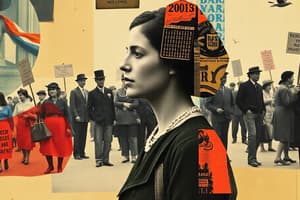Podcast
Questions and Answers
What unique challenges did enslaved African American women face during the abolitionist movement?
What unique challenges did enslaved African American women face during the abolitionist movement?
- Excessive workload due to pregnancy and childbirth (correct)
- Organizing speeches and rallies
- Sexual exploitation and violation
- Being treated as property
Which group of women played a significant role in the abolition of slavery?
Which group of women played a significant role in the abolition of slavery?
- Women from European countries
- Upper-class women
- Enslaved African American women
- White, middle-class women (correct)
In addition to being treated as property, what other form of exploitation did enslaved African American women face?
In addition to being treated as property, what other form of exploitation did enslaved African American women face?
- Financial exploitation by plantation owners
- Exploitation through political manipulation
- Exploitation through child labor
- Sexual exploitation by slave owners (correct)
What actions did some enslaved women take to resist against slavery?
What actions did some enslaved women take to resist against slavery?
Which of the following was NOT a contribution made by white, middle-class women to the abolitionist movement?
Which of the following was NOT a contribution made by white, middle-class women to the abolitionist movement?
Why is it important to acknowledge the involvement of enslaved African American women in the abolitionist movement?
Why is it important to acknowledge the involvement of enslaved African American women in the abolitionist movement?
Who wrote the novel Uncle Tom's Cabin that played a significant role in galvanizing public sentiment towards emancipation?
Who wrote the novel Uncle Tom's Cabin that played a significant role in galvanizing public sentiment towards emancipation?
Which woman organized the Seneca Falls Convention and advocated for women's suffrage alongside abolitionism?
Which woman organized the Seneca Falls Convention and advocated for women's suffrage alongside abolitionism?
What was the role of Harriet Tubman in the abolitionist cause?
What was the role of Harriet Tubman in the abolitionist cause?
Which woman, a former slaveholder, became an ardent abolitionist?
Which woman, a former slaveholder, became an ardent abolitionist?
What was the primary contribution of Frances Wright to the abolitionist cause?
What was the primary contribution of Frances Wright to the abolitionist cause?
Which novel vividly portrayed the brutality of slavery, impacting public sentiment towards emancipation?
Which novel vividly portrayed the brutality of slavery, impacting public sentiment towards emancipation?
Flashcards are hidden until you start studying
Study Notes
Women's Reform Regarding Social Evils: Abolishing Slavery
The history of women's involvement in social reform movements has been characterized by their efforts to address various evils prevalent during their time. One such significant movement was the abolition of slavery, which saw numerous influential women advocating for the end of this heinous practice. This section will explore the role played by these women in pushing for the societal change that ultimately led to the emancipation of slaves.
Women's Involvement in the Abolitionist Movement
The narrative around women participating in the abolitionist movement is often centered around the experiences of white, middle-class women, notably Susan B. Anthony, Elizabeth Cady Stanton, and Lucretia Mott. They made significant contributions to the cause through organizing speeches, rallies, and public demonstrations. However, it is important to recognize that the fight against slavery also involved enslaved African American women who were subjected to the brutal realities of bondage.
Enslaved women faced a unique set of challenges. Aside from being treated as property, they had to deal with sexual exploitation and violation by slave owners. Their workload was often more arduous due to pregnancy, childbirth, and lactation. Despite these hardships, some enslaved women found ways to resist and escape. For example, they spoke out against their oppressors, sabotaged crops, and ran away with their children. Harriet Tubman, one of the most famous conductor on the Underground Railroad, risked her life to rescue others using her knowledge of the land and intimate understanding of slaveholders' habits.
Impact of Slavery on Women
Women in different socioeconomic classes were affected by slavery differently. Enslaved women lived under the constant threat of violence and abuse. Many white, middle-class women felt obligated to protect the so-called purity of their own race while maintaining silence on the suffering of the enslaved women. Some women engaged in the slave trade themselves, either directly or indirectly through owning plantations and profiting from slave labor.
Women's Advocacy for Reform
Several women contributed significantly to the abolitionist cause. Among them were Angelina Grimké Weld, a former slaveholder who became an ardent abolitionist; Lucretia Mott, who organized the Seneca Falls Convention and advocated for women's suffrage alongside abolitionism; and Frances Wright, whose belief in equality led her to criticize both slavery and patriarchy. Harriet Beecher Stowe wrote Uncle Tom's Cabin, a novel that vividly portrayed the brutality of slavery, galvanizing public sentiment towards emancipation.
In addition to these notable figures, there were countless other women who supported the movement in various ways, such as providing shelter, education, and direct aid to escaped slaves. Despite facing social barriers and threats of violence, these women stood steadfast in their pursuit for an end to slavery, contributing significantly to the eventual abolition of this dehumanizing practice.
Studying That Suits You
Use AI to generate personalized quizzes and flashcards to suit your learning preferences.




